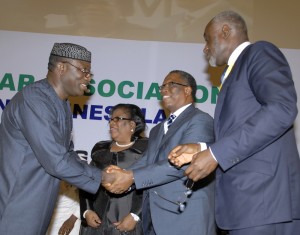
L-R: Ekiti State Governor, Dr.Kayode Fayemi; Justice Funmilayo Atilade; President, Nigeria Bar Association, Mr.Wali Okey, SAN; and Chairman, Section On Business Law, Mr. Gbenga Oyebode, .at the 7th annual business law conference,in Lagos.
Ekiti State Governor, Dr Kayode Fayemi has identified quality institutional and legal frameworks as well as infrastructural development as a sine qua non to attracting investment and creating business-friendly environment in the country.
The Governor while delivering a keynote address at the 7th annual Business Law Conference of the Business Law section of the Nigerian Bar Association (NBA), in Lagos on Monday said investors have abandoned Nigeria because the nation had not provided adequate infrastructure and institutional frameworks which could make the country a beehive for investors.
At the event were the Chief Justice of Nigeria, Justice Aloma Mukhtar who was represented by Justice Mahmud Mohammed; President of the NBA, Mr Okey Wali (SAN) and the Chairman, International Issues Committee of the Law Society of England and Wales, Mr Harold Paisner among others.
Governor Fayemi who asserted that infrastructure remains crucial in creating a business-friendly environment opined that investors are particular about whether the rule of law and the presence of functional institutions within which the conduct of economic transactions are efficiently regulated.
“Investor confidence is predicated as much on abstract properties as it is on concrete physical infrastructure. Tangibles like bridges, roads and electricity certainly matter. But laws, values, norms and functional institutions also matter. They constitute an “invisible infrastructure” which, while not obvious to the naked eye exert great influence on the business climate of a country and on the behaviour of economic actors”, he argued.
Governor Fayemi said Nigeria’s declared aspiration to be the world’s twentieth largest economy by the year 2020 aims to position her right in the centre of a defining economic power-shift but citizens’ cynicism about the vision is a reflection of the crisis of confidence that has come to define government-citizenry relationship in the country.
Fayemi opined that regardless of its conceptual shortcomings, the Vision 20:2020 programme is not just wishful thinking on the part of technocrats at the national level of government as there is a real ground for the country to entertain such ambitions.
While stating that the challenge immediately confronting Nigeria’s emerging economy is that of competitiveness on the global stage, the Governor noted that Nigeria scores poorly in the global rankings of the best places in the world to do business, even as the International Finance Corporation/World Bank’s global competitive index for the ease of ‘Doing Business’ for 2013 ranks Nigeria as 131 out of 185.
He added that one of the signs that Nigerians live in a low-trust economy is the preponderance of high interest rates on loans with very narrow performance windows as seen in the banking boom in Nigeria between 2004 and 2007 which was not accompanied by any spike in the manufacturing sector.
According to the Governor, many investment analysts classify Nigeria as a high-risk investment environment; premising their stance on political instability, policy discontinuity, the lack of institutional memory and dysfunctional bureaucracies as factors that militate against our economic viability.
Fayemi who stressed the effect of political instability on the economy said electoral fraud distorts the legitimacy of governance; adding that beneficiaries of electoral frauds leave a “legacy of uncompleted highly inflated contracts, unsustainable agreements with labour and other stakeholders in the society, uncoordinated and poorly articulated policy frameworks” among others.
“In the eyes of the international community, they certainly do us no favours and only enhance depictions of our country as a place where anything goes. If we are serious about improving investor confidence and our prospects as an emerging economy, we have to do something about this aberration to serve as deterrence to others who might be scheming their way to office through the backdoor”, he said.
On legal and regulatory framework, the Governor said his administration had since assumption of office been working to improve the legal and regulatory framework to ensure the State is attractive to investors and development partners.
He stated that for the first time since the state was created 17 years ago, his administration just revised and published the Laws of Ekiti State, which were once at the mercy of the Laws of the Old Ondo State.
Fayemi added that the administration has also taken steps to domesticate critical federal laws that promote transparency and participatory governance as the State is the first state to domesticate the Freedom of Information Act, the Child Rights Act while the ‘Gender Based Violence (Prohibition) Law among others that strengthen the rights and privileges of all segments of the society have been passed into law.
He stated that the accounts for the renewed confidence that investors and development partners alike have in Ekiti State have necessitated the return of partners such as the World Bank and the UK Department for International Development (DFID) among other which had left the State more than six years ago.
This according to Fayemi has improved quality of life and individual prospects of the people of Ekiti State.
In his welcome address, the Chairman of NBA’s Business Law section, Mr Gbenga Oyebode said the conference would reflect the roles of lawyers in the Nigerian economy; saying there is a correlation between good governance, the rule of law and the emerging economies of the developing countries.
Oyebode stressed the need for respect for human rights while the Judiciary is given more autonomy to carry out its functions effectively in order to eradicate corruption which has been the bane of the nation’s economy.
Last modified: June 18, 2013
